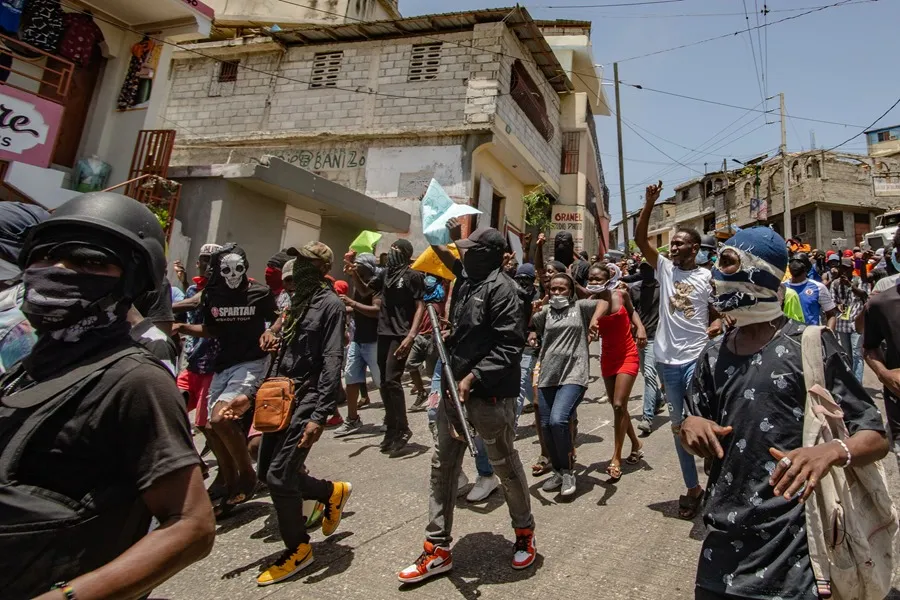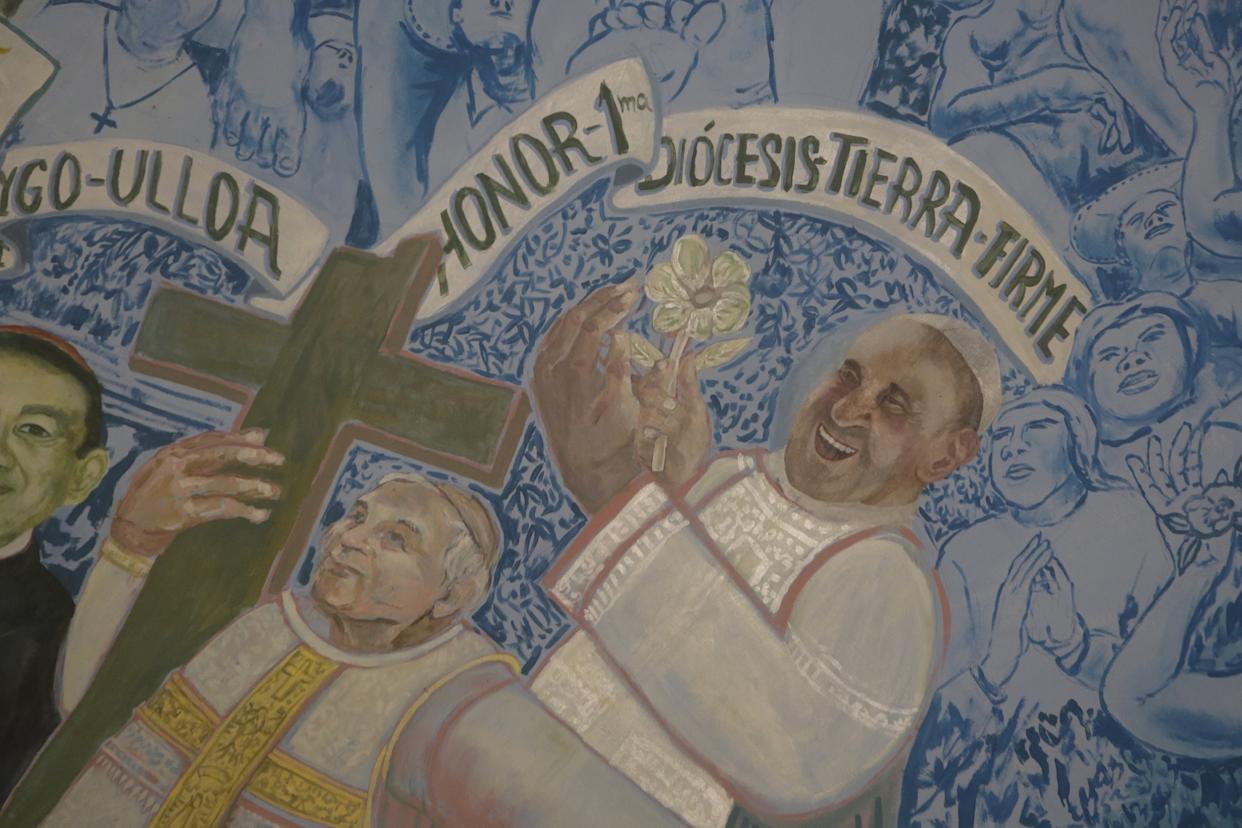International
Activities paralyzed in Haiti in the face of new threats from the barbecue gang leader

The metropolitan area of Port-au-Prince was paralyzed this Monday, due to the new threats of the leader of the coalition of ‘Vivre Ensemble’ (Live Together), Jimmy Chérizier ‘Barbecue’, about possible attacks on several neighborhoods of the capital of Haiti.
Today all schools closed their doors, several public and private institutions did not open, nor did public transport work at full capacity and small businesses marched at a low pace.
In the streets, fear and anxiety were evident on the faces of pedestrians on a day in which intense shootings were heard in several parts of the capital, including the center, which has been under the control of the gangs for almost a year, which has forced thousands of people to flee their homes and take refuge in camps and provincial cities.
Faced with this situation, the Haitian National Police (PNH) has been on maximum alert since yesterday afternoon, after the Ministry of Justice warned in a note of “threats of armed gangs.”
The director general of the Police, Rameau Normil, has instructed the central and departmental directors, the commanders of specialized units and the heads of police stations and sub-police stations to keep their troops on maximum alert and take all measures to counter any attack by armed gangs against the civilian population, according to the Facebook page of the police.
The police added that on Saturday night a “highly strategic” meeting was held to address the security situation.
He also stressed that he has strengthened security devices on several important roads to protect the lives and property of citizens.
In recent days, specialized police units such as the Temporary Anti-Band Unit, SWAT troops and the Search and Intervention Brigade, with the support of heavy equipment from the PNH, operated in several areas of central Port-au-Prince, which allowed road accesses to be cleared to “facilitate the entry of law enforcement during interventions and operations”.
In the interventions, according to the police, there were exchanges of gunfire with the gang members.
On the other hand, last Friday the Prime Minister of Haiti, Alix Didier Fils-Aimé, chaired a meeting of the Governing Council in which ministers and secretaries of state evaluated the progress of the major national projects, with special attention to insecurity in the country.
To combat violence, Fils-Aimé has promised the acquisition of equipment to reinforce the PNH and the Armed Forces, as well as further training of security forces and strategic coordination to carry out faster and more effective interventions.
According to data verified by the United Nations Office for Human Rights, at least 5,601 people died in Haiti in 2024 as a result of the actions of criminal gangs (a thousand more than the previous year), 2,212 people were injured and 1,494 were kidnapped.
In mid-January, the International Organization for Migration (IOM) reported that the number of displaced people in Haiti has tripled in just one year and has exceeded one million people (1,041,000), of whom more than half are children.
International
DHS Secretary Kristi Noem’s Purse Stolen in D.C. Restaurant Heist

The purse of Kristi Noem, Secretary of the Department of Homeland Security, was stolen on Sunday night at a restaurant in Washington, D.C., Fox News Digital confirmed through several agency sources.
The handbag, taken by a white male wearing a mask, reportedly contained $3,000 in cash along with personal documents, including her passport, keys, driver’s license, and DHS badge, according to an agency spokesperson.
“Her entire family was in town, including her children and grandchildren. She was celebrating her retirement by treating them to dinner, activities, and Easter gifts,” the spokesperson added.
Crime continues to be a significant issue in the U.S. capital, particularly theft. However, violent crime reached its lowest level in 30 years last year, according to the Office of the Attorney General at the time.
International
Pope Francis: The Quiet Architect Behind the U.S.-Cuba Thaw

When then-U.S. President Barack Obama and Cuban President Raúl Castro announced the reestablishment of diplomatic relations in December 2014—after decades of hostility—there was a third figure present in both speeches: Pope Francis.
This thaw in U.S.-Cuba relations—later reversed by Donald Trump—was the result of behind-the-scenes negotiations personally encouraged by Pope Francis, who passed away on Monday at the age of 88, just over a year after becoming head of the Catholic Church.
Upon learning the news of the breakthrough, the pontiff humbly stated, “This was made possible thanks to the ambassadors and to diplomacy,” which he called “a noble, very noble job.”
In 2015, months after the announcement, Raúl Castro visited the Vatican and met with the pope. Over time, Castro developed a fondness for Francis that he never had for his predecessors, Benedict XVI and John Paul II. “If the Pope continues talking like this, sooner or later I’ll start praying again and return to the Catholic Church—and I’m not joking,” said the younger Castro, who, like his brother Fidel (1926–2016), had been educated by Jesuits—the same order to which Pope Francis belonged.
Pope Francis visited Cuba later that year. Just days before his arrival, the Cuban government announced the pardon of 3,522 common prisoners as an act of clemency.
While in Havana, the pope met with Fidel Castro, who gave him a first edition of the book Fidel and Religion by Brazilian friar and liberation theologian Frei Betto.
Criticism from the Opposition
Francis’s diplomatic approach also drew criticism from parts of the Cuban opposition. In a 2022 interview with Univision, the pope revealed he had “a human relationship” with Raúl Castro.
International
Dominican Republic Declares Three Days of Mourning for Pope Francis

Dominican Republic President Luis Abinader has declared three days of national mourning starting Tuesday following the death of Pope Francis, who passed away on Monday at the age of 88 in his residence at the Casa Santa Marta.
In an official decree, Abinader highlighted the pope’s legacy “as a global leader who promoted significant reforms within the Catholic Church and was known for his humility, openness to dialogue, and commitment to peace among nations.”
During the mourning period, the national flag will be flown at half-staff at military facilities and public buildings.
According to a statement from the Office of the Presidency, although Pope Francis never visited the Dominican Republic during his papacy, he maintained a close relationship with the country. He expressed solidarity and empathy during difficult times, including offering prayers for the victims of the recent tragedy at a Santo Domingo nightclub on April 8, which claimed 232 lives and left more than 180 injured.
-

 Central America5 days ago
Central America5 days agoNicaraguan Exiles to Mark 7th Anniversary of 2018 Protests with Global Commemorations
-

 International5 days ago
International5 days agoDominican ‘False Hero’ Arrested for Faking Role in Nightclub Collapse That Killed 231
-

 Central America3 days ago
Central America3 days agoUN complaint filed against Costa Rica over detention of migrant children
-

 International3 days ago
International3 days agoACLU seeks emergency court order to stop venezuelan deportations under Wartime Law
-

 Central America2 days ago
Central America2 days agoSenator Van Hollen Meets with Deported MS-13 Member in El Salvador; Trump and Bukele React
-

 International2 days ago
International2 days agoThousands rally nationwide against Trump’s threat to U.S. democracy
-

 International2 days ago
International2 days agoPope Francis Appears for Easter Blessing, Calls for Peace and Religious Freedom
-

 Central America11 hours ago
Central America11 hours agoCardinal Rodríguez to Attend Funeral of Pope Francis: “He Was Very Dear to Me”
-

 Central America11 hours ago
Central America11 hours agoNicaragua’s Ortega and Murillo Mourn Pope Francis, Acknowledge ‘Difficult’ Relationship
-

 International11 hours ago
International11 hours agoDominican Republic Declares Three Days of Mourning for Pope Francis
-

 International11 hours ago
International11 hours agoDHS Secretary Kristi Noem’s Purse Stolen in D.C. Restaurant Heist
-

 International11 hours ago
International11 hours agoPope Francis: The Quiet Architect Behind the U.S.-Cuba Thaw















